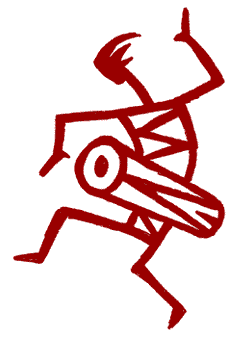

Thought of the Week Archives |
 |

|
|
|
December 3, 2001 Homework That Heals - Meditation This week I want to introduce another classic, self-directed means of augmenting the process of growth and healing. Meditation can be a confusing subject because it is a word that indicates different things in different cultures and traditions. At one extreme, it means to think deeply on a subject, and at the other, it means to not think at all! To me, the word meditation means "attention." The root of the word "attention" is "attend" - to be present, to be here. Its Latin roots are "tendere" (to stretch) and "at" (to) - that is, "to stretch to" or "to attach to," like a tendon connecting a bone to muscle. To be alive is to attend to the sensations of life. If the sensations in our mouth are attended to, we fully taste the pie. If the pain in our foot is attended to, our leg muscles lift it off the sharp rock. Depending on circumstances, attention can be simple and whole, or complex and chaotic. If, for instance, attention is bouncing between daydreams, thoughts, TV images, computer programs, recorded music, magazine photos, printed words, and social conversation, it may not be with our body and feelings. Due to regular neglect and abuse in childhood, we often develop distracted attention as a way of coping with the pain of our lives and feelings. Life is attention. Many of us have become "out of touch" with our lives and suffer because of it. Meditation, as a practice of attention, can help. Some of the benefits of meditation are to allow our attention to:
• simplify and settle Meditation can allow us to open up and focus our attention on painful feelings to release them, as well as focus our attention away from painful feelings to ground and shield ourselves. It can also assist us by focusing on the real, positive, nurturing elements in present-day life. I also find meditation far safer and more effective than the "cognitive behavioural" approaches which are very "in" right now. Psychotherapists using these approaches direct you to adjust your thinking and behaviour patterns from negative to positive, according to the therapist's idea of what is "good for you." Meditation, on the other hand, is simply your own awareness, from which recognition and healing naturally flow. There's no external manipulation - it's like the body's immune system healing itself. And if you're looking for credentials and reliability, meditation can't be beat. Cognitive behavioural psychotherapy has only been around for a few decades. Meditation has a successful track record that is as old as humanity itself. Another great thing about meditation is that it's something you can do every day, for free, and without the direct supervision of a therapist. Even though it is a gentle approach, do keep in mind that focused meditation may allow unresolved pain to rise into consciousness. Caution and moderation are always recommended. If you feel that you need instruction from a "meditation expert," be aware that the simple, stripped down version I recommend may not be what other instructors suggest. Many insist on the use of mantras ("holy" phrases), imagery, and submission to a certain belief system. As far as I'm concerned, attention and healing are natural to the organism and do not require diversions and complexity. Simple is best. The introductory method I recommend is outlined at http://www.primalworks.com/primalzen6.html Read the general section "Still Attention." Under the heading "Various Forms - Focused to Unfocused," follow the instructions for "Counting the Breath." Eventually you can move on to other forms if you wish. As an adjunct to primal integration work with a therapist, I suggest sitting in meditation no less than 15 minutes at a time, and if possible, at least once a day. And be sure to write the experiences in your journal! * * *
Homework That Heals - Introduction |